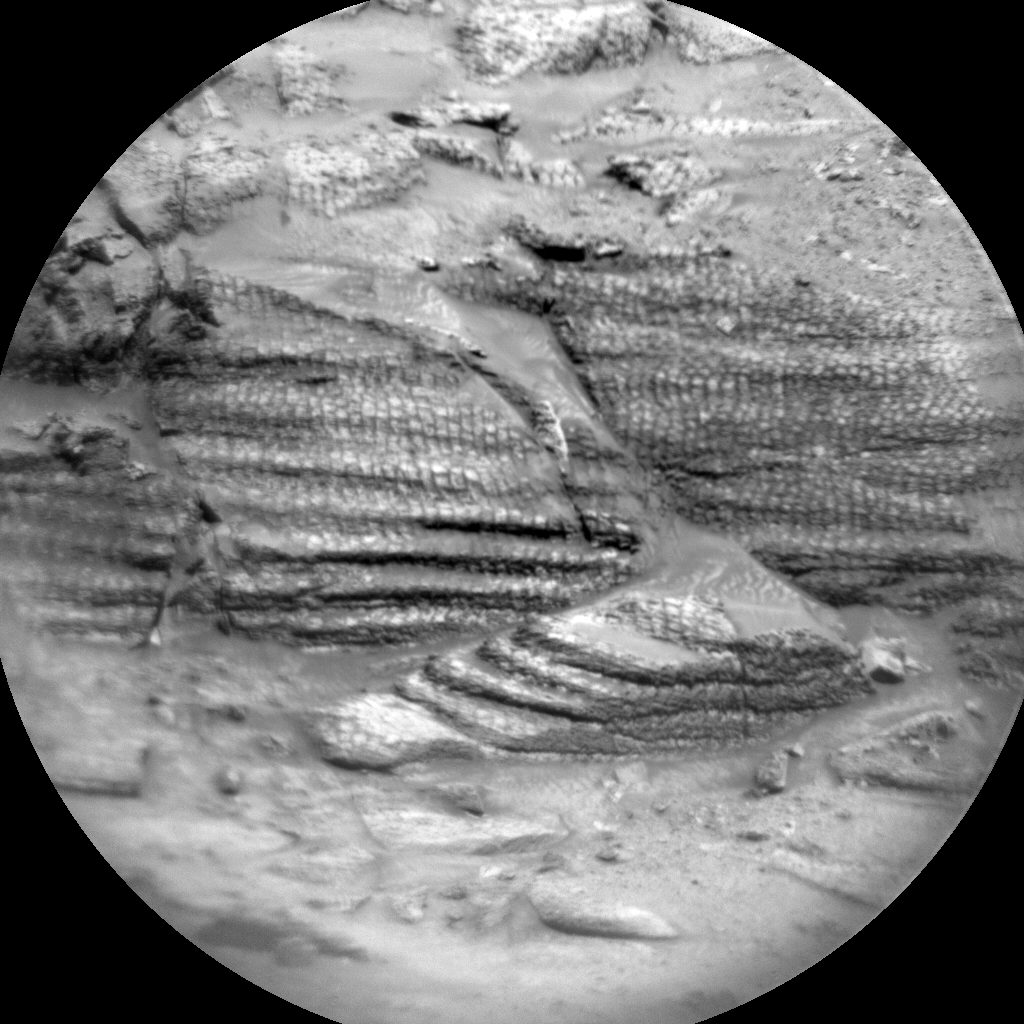2 min read
Curiosity Blog, Sols 4575-4576: Perfect Parking Spot NASA’s Mars rover Curiosity acquired this image of interesting textures exposed in an outcrop at the base of the “Mishe Mokwa” butte, ahead of the rover, using its Chemistry & Camera (ChemCam) Remote Micro Imager (RMI). Curiosity captured the image on June 13, 2025 — Sol 4569, or Martian day 4,569 of the Mars Science Laboratory mission — at 17:53:55 UTC. NASA/JPL-Caltech/LANLWritten by Lucy Thompson, APXS Collaborator and Senior Research Scientist at the University of New Brunswick
Earth planning Wednesday, June 18, 2025
Not only did our drive execute perfectly, Curiosity ended up in one of the safest, most stable parking spots of the whole mission. We often come into the start of planning hoping that all the wheels are safely on the ground, but the terrain on Mars is not always very cooperative. As the APXS strategic planner I was really hoping that the rover was stable enough to unstow the arm and place APXS on a rock — which it was! We are acquiring APXS and ChemCam compositional analyses and accompanying Mastcam and MAHLI imaging of a brushed, flat, typical bedrock target, “Tarija.” This allows us to track the chemistry of the bedrock that hosts the potential boxwork features that we are driving towards.
As well as composition, we continue to image the terrain around us to better understand the local and regional context. Mastcam will acquire mosaics of some linear ridges off to the north of our current location, as well as of a potential fracture fill just out in front of our current parking spot, “Laguna del Bayo.” ChemCam will image part of an interesting outcrop (“Mishe Mokwa”) that we have already observed (see the image associated with this blog).
Thanks to the relatively benign terrain, the engineers have planned a 54-meter drive (about 177 feet) to our next location. After that drive (hopefully) executes successfully, we have a series of untargeted science observations. MARDI will image the terrain beneath the wheels and ChemCam will pick a rock target autonomously from our new workspace and analyze its chemistry.
To track atmospheric and environmental fluctuations, we are acquiring a Mastcam tau to measure dust in the sky as well as a Navcam large dust-devil survey and suprahorizon movie. The plan is rounded, as always, with standard DAN, REMS, and RAD activities.
For more Curiosity blog posts, visit MSL Mission Updates Learn more about Curiosity’s science instrumentsShare
Details
Last Updated Jun 20, 2025Related Terms
BlogsExplore More
3 min readCuriosity Blog, Sols 4573-4574: Welcome to the Uyuni Quad
Article 2 days ago3 min read
Curiosity Blog, Sols 4570-4572: A Fond Farewell, With a Side of Frost
Article 6 days ago2 min read
Curiosity Blog, Sols 4568-4569: A Close Look at the Altadena Drill Hole and Tailings
Article 7 days agoKeep Exploring
Discover More Topics From NASA
Mars
Mars is the fourth planet from the Sun, and the seventh largest. It’s the only planet we know of inhabited…
All Mars Resources
Explore this collection of Mars images, videos, resources, PDFs, and toolkits. Discover valuable content designed to inform, educate, and inspire,…
Rover Basics
Each robotic explorer sent to the Red Planet has its own unique capabilities driven by science. Many attributes of a…
Mars Exploration: Science Goals
The key to understanding the past, present or future potential for life on Mars can be found in NASA’s four…
Read More Details
Finally We wish PressBee provided you with enough information of ( Curiosity Blog, Sols 4575-4576: Perfect Parking Spot )
Also on site :
- Tech Billionaire Reveals Plans To Leave Fortune To All 106 Of His Children
- '70s Star Says 'Star Trek' Actor Is Her 'Favorite Person to Kiss' Besides Her Husband
- Teen shot, killed at Torrance pool party was reportedly picking up sibling

